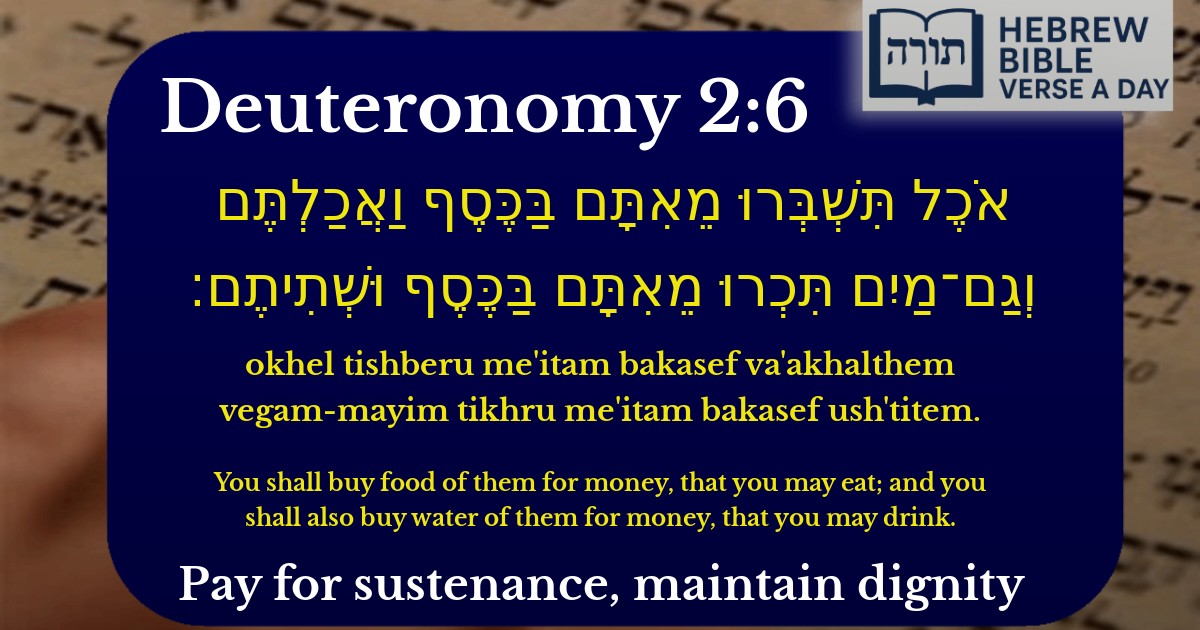Frequently Asked Questions
Q: What does Deuteronomy 2:6 mean?
A: Deuteronomy 2:6 instructs the Israelites to purchase food and water from the descendants of Esau (Edomites) when passing through their land, rather than taking it by force. This teaches the importance of fair dealings and respecting the property of others, even when passing through foreign territories. Rashi explains that this was a test for the Israelites to demonstrate ethical behavior.
Q: Why is it important that the Israelites had to pay for food and water?
A: Paying for food and water demonstrates the Torah's emphasis on justice and ethical conduct. Even though the Israelites could have taken these resources by force, Hashem commanded them to act with integrity. The Rambam (Hilchot Melachim 6:1) later derives from this verse that even during wartime, Jews must conduct business fairly with non-combatants.
Q: What lesson can we learn from Deuteronomy 2:6 today?
A: This verse teaches that we must respect others' property and conduct business honestly, even when we might have an advantage over others. The Talmud (Chullin 94b) expands on this principle, teaching that one should go beyond the strict letter of the law to act with extra fairness (lifnim mishurat hadin).
Q: Why did G-d command the Israelites to buy from the Edomites specifically?
A: The Edomites were descendants of Esau, Jacob's brother, and therefore distant relatives of the Israelites. Though they were not always friendly to Israel, the Torah (as explained by Ibn Ezra) shows we must maintain basic ethical standards even with those who may oppose us. This sets a precedent for proper conduct between nations.
Q: How does this verse relate to the Jewish view of business ethics?
A: This verse establishes a fundamental Torah principle that one must pay fair value for goods and services. The Shulchan Aruch (Choshen Mishpat 227) later codifies detailed business laws based on such biblical precedents. Even when traveling or in need, one must conduct transactions properly rather than take advantage of others.


Context in Devarim (Deuteronomy 2:6)
This verse appears in Parashat Devarim, where Moshe recounts the journey of Bnei Yisrael through the wilderness. The command pertains to their interactions with the descendants of Esav (Edom), emphasizing that they must purchase food and water rather than taking them by force.
Rashi's Explanation
Rashi (Devarim 2:6) highlights that this directive demonstrates Hashem's kindness—even though Bnei Yisrael had the manna, they were permitted to buy additional food to enjoy variety. Additionally, Rashi notes that this command reinforced peaceful relations with Edom, as they were descendants of Yaakov’s brother Esav, and conflict was to be avoided.
Rambam on Ethical Conduct
Rambam (Hilchot Melachim 6:1) derives from this verse a broader principle of ethical warfare: even when passing through enemy territory, Bnei Yisrael were commanded to engage in fair commerce rather than seizing resources. This sets a precedent for derech eretz (proper conduct) in dealings with other nations.
Midrashic Insight
The Midrash (Devarim Rabbah 1:12) teaches that this verse underscores the importance of maintaining dignity in sustenance. By purchasing food and water, Bnei Yisrael avoided dependence on miracles (beyond the manna) and upheld self-sufficiency where possible.
Halachic Implications